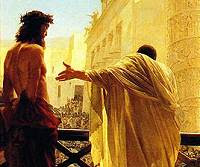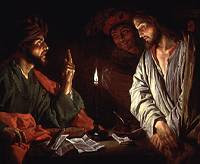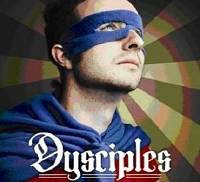The day was grey and cold, but dry. People arrived at
Moggerhanger Park and chatted for a while, then at 13:30 we set out to walk through the woods to look at the snowdrops.

How beautiful they are, evidence that even in late winter there is life waiting to spring up wherever it can!
A hot mealBack in the house we settled down to a hot meal of jacket potatoes with a choice of fillings - pork sausage and apple, or chicken and mushroom.
We sat in a large, double circle for the meeting. I began by welcoming everyone and commenting that church life was like the snowdrops, it has been hidden but is now springing up everywhere in the UK! Even so, most of us feel isolated and lonely in our little groups and it was good to get together like this for encouragement and a reminder that we are
not alone.
Three short talksPeter Farmer - Pete explained how he's been travelling the UK. There are 12 EU regions and he visited them all during 2009, one per month. He met something like six groups in most regions.
A person goes through stages in life, beginning as a child, then becoming a young person, and finally maturing into an adult. Churches go through similar stages, and most house churches in the UK are in the child stage. But Pete is looking ahead, as they mature how will they multiply? Adults produce offspring and churches should do the same.
He pointed out that there's ample opportunity. Ninety-eight percent of the UK population doesn't know Christ and needs to be reached. This is already happening in Asia as the house churches multiply, the numbers are staggering. 300 000 new churches planted in India, with 300 000 baptisms on the Day of Pentecost alone!
Pete lives in Nottingham, for more details see
Mission Britain and his
personal blog.
Chris Jefferies - I explained the idea behind Church of Two (CO2) and how useful I had found it in practice. It takes about five minutes per person so two or three people will need ten or fifteen minutes and can meet every day, something that is impractical with larger groups. CO2 is based on intentionally listening to what the Lord is saying individually, and then meeting to share what has been heard. The members also share their own feelings for the day under the headings sad, angry, scared, happy, excited, and tender.
In this way the group is daily sharing the Lord's heart and their own hearts with one another. It's then useful to pray for one another on the basis of what has been shared. CO2 is best done face to face, but where that's not possible it can be done over the phone or as a last resort by email.
I'm willing to run CO2 for a week with anyone who'd like to try it, doing it is by far the best way to learn it and discover if it might be useful.
I live in St Neots, you can read more on
my website and on the blog '
All about Jesus'.
Pete Stamford - Pete described the excellent work done by X-treme Youth Camps and explained how it all began. He'd been thinking about a youth Alpha but wasn't sure how to approach it. As he was going upstairs one evening he heard a clear word from the Lord, 'What did you enjoy doing when you were a kid?'
The answer was fishing, making rafts, spending time roaming outside in the country, climbing trees. All the sorts of things that can be impossible for young people living in urban housing. Pete was looking for a way of reaching young people for the Lord, and he has found that fun and good food with sound teaching about Jesus is a winning combination. So the camps include canoeing, archery, games, music and more along with very direct, basic details about who Jesus is, why he came, how and why he died, and what this means for us.
Pete lives in Sharnbrook a few miles north of Bedford. I don't have a website for Pete, but this item from '
All About Jesus' shows him at work. The video is a trailer for the 2007 camp and Pete appears in the still, teaching archery.
The Open MeetingThe rest of the meeting was an open session. Nobody led and nothing was prepared beforehand, instead we looked to the Holy Spirit to guide us and show us what to do. He gave us songs, tongues and interpretation, and words of prophecy - some for the nation, some for particular people in the room. As the meeting progressed it moved more towards teaching. The meeting was rich and there was far too much to report in detail, but here are some notes that I took of things that particularly stood out for me. Words in
italics were from the Lord.
I will bring a great awakening in this land and I will honour my name through wonders. Depend on me for your sustenance, for food and for water.
I am the River of Life. It's not a question of how much I can provide, it's a question of how much you can receive.Don't look to yourself, look to him. Our vision is on him all the time.
Stand still, be in the right position, the right place. We need to listen with our hearts (not just with our ears).
There was a word for Paul.
You are carrying around something from the past. Only I (the Lord)
can fix it.
Proclaim from the rooftops what I have shown you in the morning. If I give you words to speak, now is the time to speak them.This encouraged me to share some words he'd given me a few days earlier.
There is dislocation in our lives and a constant war between the will and purpose of Christ in us and the will and purpose of the enemy against us. We see this in creation itself, a raging war at times, a tense stand-off at others. A beautiful sunset here, a sudden earthquake there. A song of love here, a starving child there. A kind thought here, a burst of anger there. Within us and around us is the constant conflict of two empires, the Kingdom of Light and the principality of darkness.
I felt that Father calls us to the Light every minute of every day. His Son is the Light, the Light shining in the darkness, Light among humankind, Light in the world. Every moment, in every situation, we can choose the Light or we can choose darkness. We can listen to Christ or we can listen to the enemy. Overall we have made our choice, we have chosen the King of Light, we have chosen life in the Kingdom of Heaven. Yet moment by moment we still fight those tactical skirmishes. They cannot change the outcome of the war - we belong to Christ! HalleluYah! But they may cause short-term retreat as individual actions are won or lost.
The Lord says,
Don't despair, don't fight in your own strength but put on all the armour I have provided, be filled with the gifts of my Son's Spirit, and stand against darkness. Stand in the Light! Stand side by side and stand back to back, together you are strong, individually you are weak.
The door is open, take my hand and walk through. I will give you the desires of your heart because they are my desires too.Someone mentioned
Jeremiah 29:11, 'For I know the plans I have for you," declares the LORD, "plans to prosper you and not to harm you, plans to give you hope and a future'. This was a promise to bring them back from captivity to the land that was promised to them. We too need to remember who the Lord is and admit that we need his help. We should not be discouraged by the forces ranged against us. We need to focus on Jesus, he will provide our strength and joy.
Acts was also quoted and the comment made that they were persecuted, they responded, and the result was amazing. Now is the time for us to prepare for persecution and hardship.
Someone said that as the church we have failed our country, we have failed the Lord, and we have failed ourselves. There has been an inertia, an unwillingness in the church. There was a tongue, part sung, part spoken. Both parts were interpreted, the sung part was interpreted in song which was amazing.
Here are fragments of the interpretations, there was a reminder that we are 'a chosen people, a holy nation... from
1 Peter 2.
The Lord has first loved us, we also love him. He has restored our sight, we can leave our foreskins behind. We can deal with rejection. Because he loves us we can also love him and be full of joy, both in the Lord and in others. We need to strip off the old things and can now put on his new clothes.
Peter Farmer also has brief
notes about the meeting on the Mission Britain website.
Next MeetingWe have pencilled in a date for a meeting on 6th June, another Sunday afternoon. The format might be entirely different next time, perhaps a picnic, but the aim will be to have a meal together and an open meeting where everyone can contribute.
More details later, but meanwhile mark 6th June in your diary!
 I plan to share these thoughts from time to time when I consider they might be useful to others. Take whatever seems good or helpful.
I plan to share these thoughts from time to time when I consider they might be useful to others. Take whatever seems good or helpful.

























